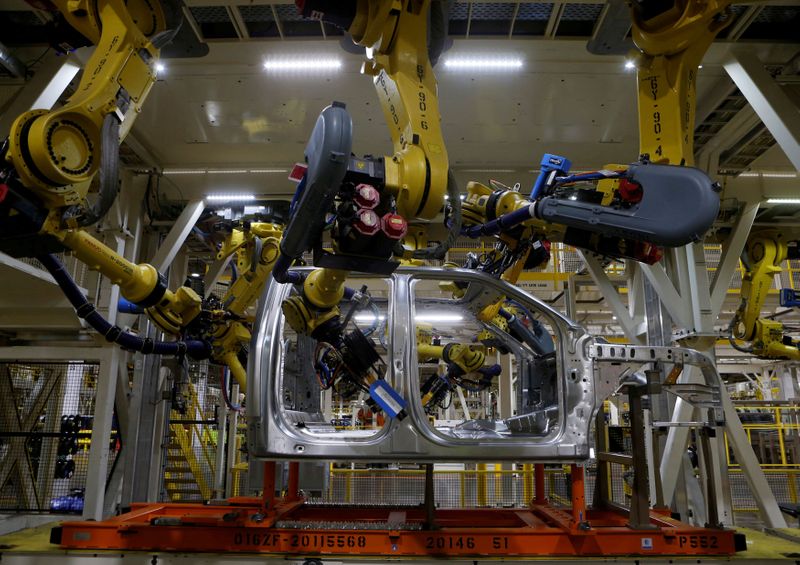 © Reuters. FILE PHOTO: File photo of the aluminium cab of the then all-new 2015 F-150 pick-up truck moves down the robot assembly line at the Ford Rouge Center in Dearborn, Michigan 2/2
© Reuters. FILE PHOTO: File photo of the aluminium cab of the then all-new 2015 F-150 pick-up truck moves down the robot assembly line at the Ford Rouge Center in Dearborn, Michigan 2/2By Timothy Aeppel
(Reuters) – The robot invasion slowed a bit last year.
U.S. companies installed fewer robots in 2019 than they did the year before, the first cut back since 2015, as a downturn in manufacturing fueled by trade wars and weaker demand dampened appetite for the machines.
Shipments fell to 23,758, a more than 16% drop, according to data seen by Reuters that was set for release on Tuesday by the Association for Advancing Automation, an industry group based in Ann Arbor, Michigan.
Robot shipments also fell in Mexico last year, declining 25% to 3,263, while shipments in Canada roughly held steady at just over 3,000 units.
(GRAPHIC: Robot shipments slowed last year, https://fingfx.thomsonreuters.com/gfx/editorcharts/US-ECONOMY-ROBOTS/0H001R89SBT5/index.html)
A major goal of President Donald Trump has been to drive manufacturers to bring work back to the United States, presumably aided by new automation and robotics that would allow domestic plants to compete with cheaper labor in China and other lower-cost countries. But that trend appears to have been overwhelmed by a larger slowdown in manufacturing.
Alexander Shikany, vice president of the Association for Advancing Automation, said the slowdown is likely to be short lived. Orders for new robots in North America, a separate measure that gives a sense of how many machines will be installed in future months, increased last year by 1.6% to 29,988 units, Shikany noted.
The largest driver of that growth was a more than 50% jump in orders from automakers, which Shikany said were making robots part of their investment in the next wave of automotive technology.
No. 1 U.S. automaker General Motors Co (N:), for example, recently announced it was investing $2.2 billion to build electric trucks and autonomous electric vehicles at its Detroit-area plant in Hamtramck, Michigan.
Hytrol Conveyor Co Inc, a privately held company in Jonesboro, Arkansas, that produces conveyor belts and had sales last year of over $200 million, did not cut back on robot installations in 2019. With demand from e-commerce businesses and other warehouse operations booming, the company spent $1.9 million last year to help automate its assembly line.
David Peacock, the company’s president, said the company realized three years ago it would have trouble keeping up with demand growth without more robots.
The investments have not cut jobs. Headcount at Hytrol Conveyor’s factory has increased 18% over the past three years to 1,300 workers. Revenues, meanwhile, are up nearly a quarter.
Fusion Media or anyone involved with Fusion Media will not accept any liability for loss or damage as a result of reliance on the information including data, quotes, charts and buy/sell signals contained within this website. Please be fully informed regarding the risks and costs associated with trading the financial markets, it is one of the riskiest investment forms possible.



